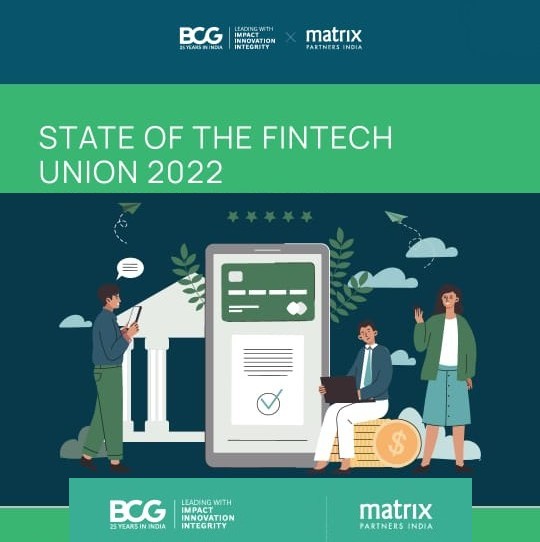Matrix Partners India and Boston Consulting Group (BCG) published a research report titled ‘State of India Fintech Union 2022’
The report states that Indian fintechs have made a strong contribution to the growth of the economy
Bengaluru, NFAPost: More than 70% of respondents believe most Fintechs may not be profitable in the next 2-3 years, owing to an increased focus on scale as opposed to profitability and compliance, states a report published by Matrix Partners India and Boston Consulting Group (BCG).
The research report titled ‘State of India Fintech Union 2022’ states that Indian fintechs have made a strong contribution to the growth of the economy.
“Fintechs have made a strong contribution to Indian economy, clocking over $800 billion annual payments transaction value, touting itself as an important segment in achieving the $5 trillion Indian economy goal,” states the report.
The report addresses the future of Fintechs and the sustainability of their business models amidst market uncertainties and regulatory scrutiny. The report outlines key priorities and significant challenges that will dictate the future of Fintech in India.
The report includes results from a survey of 125+ Founders/CXOs of leading Fintechs and Incumbents along with insights from a 4-part virtual panel discussion series held with industry thought leaders in July 2022.
Commenting on the report, Matrix India Managing Director Vikram Vaidyanathan states the country is at a fork in the road in the India fintech story with sceptics raising many questions.
“Indian fintechs have undeniable scale, provided superior value to customers and have emerged resilient through a once-in-a-lifetime crisis in Covid. Through our SOFTU effort, we heard (a) clear support to the ecosystem from incumbents and curious regulators and (b) universal confidence from fintech founders that they would answer the questions on sustainability and governance,” said Matrix India Managing Director Vikram Vaidyanathan.
He also said Matrix are believers in India’s fintechs and think this story is just getting started.
BCG Managing Director and Partner Yashraj Erande opined that FinTech sector is mission-critical for the Indian economy.
“36% of Fintech customers are new-to-credit, vs 22% for Banks. “Fin” in FinTech is acquiring a bigger font. This means a greater focus on profitability and governance. Relentless focus on innovation and customers made fintechs successful,” said BCG Managing Director and Partner Yashraj Erande.
He also highlighted that even though it should continue but at the same time new muscle needs to be added for newer priorities. “‘Growing together’ in partnership with incumbents and private innovation on public utilities will be key moats,” said BCG Managing Director and Partner Yashraj Erande.
Highlights of the survey include:
The uncertainty brought on in the last few years due to COVID have been a testing period for fintech’s, while businesses were under stress and went through closure, majority of the fintechs have survived and demonstrated their “immunity” to withstand such adverse events
Our survey revealed that product expansion (82%), improving customer service (61%) and hiring (75%) are key priorities for the industry today
Incumbents are set-up to live in a two-speed world – need to build partnership BUs to drive penetration and enhance and simplify ops, tech and processes to launch agile, rapid iterative business models in partnership with fintechs
India’s regulatory framework has been a poster child for the global financial services landscape. As our fintech landscape matures, “4C & a B” of policy enablers will go a long way in supporting the industry – Clarity & Consistency, communication, collaboration, calibration, and benchmark to global.
Segment specific highlights include:
Lending
Cards, Unsecured lending are the top choice among survey respondents as areas to be disrupted
50%+ respondents believed asset quality, CAC and regulations are top challenges to sustainability
Getting to meaningful scale is a barrier on the path to building a profitable lending business.
Payments
Payments has moved from being barebone APIs to becoming a holistic experience-product. Paytechs are looking to control and solve the payments experience – through one-click checkout, BNPL etc.
70% payment players are looking to tap into alternative revenue sources and lending emerges as the clear winner here
UPI powered credit, MDR commensurate to value-added and monetisation through value-added services are seen to drive growth and innovation
Insurance
~50% respondents believe that health insurance is most likely to be disrupted.
Regulatory changes such as usage-based insurance, simplified product filing guidelines and flexibility in the empanelment of cashless hospitals supportive
Product flexibility in structure and pricing, going beyond insurance to service and solutions, leveraging changing regulatory landscape to drive growth ahead
Wealth Management
Wealth-techs are focused on driving monetization via expanding into new assets. Participants feel devising the right entry product for mass retail customers is the need of the hour
Players see opportunities of disruption in investment advisory, through helping customers avoid “money mistakes”
Easing the process for advisor fee collection, and providing access to AA ecosystem, with market-wide depositories information access are key enablers needed
Neobanks
Seamless onboarding and frictionless customer journey are a major value proposition for customers
Key challenge for neobanks is the path to profitability given high CAC (67%) and low ARPU (61%).
Building an assets first franchise is possible for Neobanks as India is a credit-starved market.
Enablers like AA and a supportive digital banking regulation can help drive sustainability and make Neobanks mainstream
The report also highlights that as the industry matures fintechs should embrace compliance and privacy by design. It further underscores the importance of a focus on profitability from day 1, best in class governance, risk management and policy enablers to ensure continued growth and innovation.





